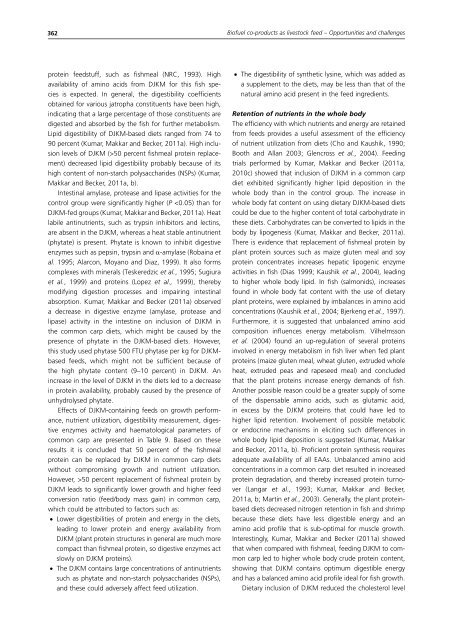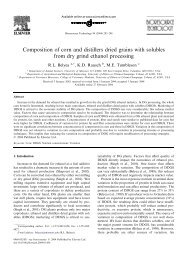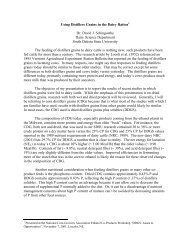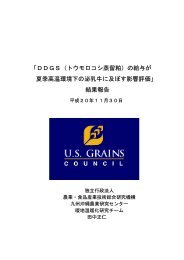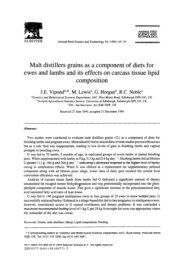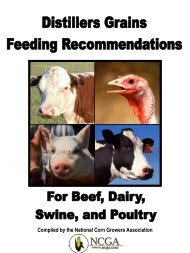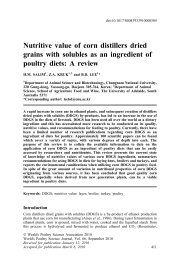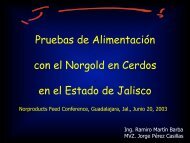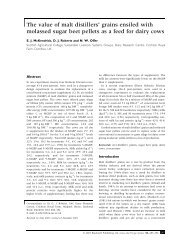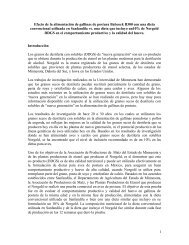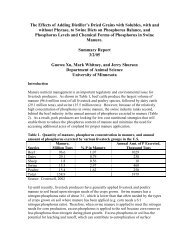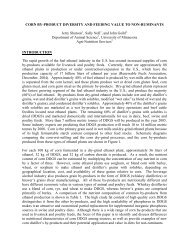- Page 1 and 2:
BIOFUEL CO-PRODUCTS AS LIVESTOCK FE
- Page 3:
Recommended citationFAO. 2012. Biof
- Page 6 and 7:
vco-products to swine - Feeding cru
- Page 8 and 9:
viiCHAPTER 22Use of Pongamia glabra
- Page 10 and 11:
ixPrefaceHumans are faced with majo
- Page 13 and 14:
xiiCBMCBSCCDSCCKCDOCDSCFCFBCFRCGECI
- Page 15 and 16:
xivHCHOHClHCNHisH-JPKMHMCHPDDGHPDDG
- Page 17 and 18:
xviPPbPCVPDPEMPFADPhePJPKCPKEPKMPKO
- Page 19 and 20:
xviiiWBPWCGFWDGWDGSWDGSHWPCWTWWWNSK
- Page 21 and 22:
2Biofuel co-products as livestock f
- Page 23 and 24:
4Biofuel co-products as livestock f
- Page 25 and 26:
6Biofuel co-products as livestock f
- Page 27 and 28:
8Biofuel co-products as livestock f
- Page 29 and 30:
10Biofuel co-products as livestock
- Page 31 and 32:
12Biofuel co-products as livestock
- Page 33 and 34:
14Biofuel co-products as livestock
- Page 35 and 36:
16Biofuel co-products as livestock
- Page 37 and 38:
18Biofuel co-products as livestock
- Page 39 and 40:
20Biofuel co-products as livestock
- Page 41 and 42:
22Biofuel co-products as livestock
- Page 43 and 44:
24Biofuel co-products as livestock
- Page 45 and 46:
26Biofuel co-products as livestock
- Page 47 and 48:
28Biofuel co-products as livestock
- Page 49 and 50:
30Biofuel co-products as livestock
- Page 51 and 52:
32Biofuel co-products as livestock
- Page 54 and 55:
35Chapter 3Impact of United States
- Page 56 and 57:
Impact of United States biofuels co
- Page 58 and 59:
Impact of United States biofuels co
- Page 60 and 61:
Impact of United States biofuels co
- Page 62 and 63:
Impact of United States biofuels co
- Page 64 and 65:
Impact of United States biofuels co
- Page 66 and 67:
Impact of United States biofuels co
- Page 68 and 69:
Impact of United States biofuels co
- Page 70 and 71:
Impact of United States biofuels co
- Page 72 and 73:
Impact of United States biofuels co
- Page 74 and 75:
Impact of United States biofuels co
- Page 76 and 77:
Impact of United States biofuels co
- Page 78:
Impact of United States biofuels co
- Page 81 and 82:
62Biofuel co-products as livestock
- Page 83 and 84:
64Biofuel co-products as livestock
- Page 85 and 86:
66Biofuel co-products as livestock
- Page 87 and 88:
68Biofuel co-products as livestock
- Page 89 and 90:
70Biofuel co-products as livestock
- Page 91 and 92:
72Biofuel co-products as livestock
- Page 93 and 94:
74Biofuel co-products as livestock
- Page 95 and 96:
76Biofuel co-products as livestock
- Page 97 and 98:
78Biofuel co-products as livestock
- Page 99 and 100:
80Biofuel co-products as livestock
- Page 101 and 102:
82Biofuel co-products as livestock
- Page 103 and 104:
84Biofuel co-products as livestock
- Page 105 and 106:
86Biofuel co-products as livestock
- Page 107 and 108:
88Biofuel co-products as livestock
- Page 109 and 110:
90Biofuel co-products as livestock
- Page 111 and 112:
92Biofuel co-products as livestock
- Page 113 and 114:
94Biofuel co-products as livestock
- Page 115 and 116:
96Biofuel co-products as livestock
- Page 117 and 118:
98Biofuel co-products as livestock
- Page 120 and 121:
101Chapter 6Hydrogen sulphide: synt
- Page 122 and 123:
Hydrogen sulphide in cattle fed co-
- Page 124 and 125:
Hydrogen sulphide in cattle fed co-
- Page 126 and 127:
Hydrogen sulphide in cattle fed co-
- Page 128 and 129:
Hydrogen sulphide in cattle fed co-
- Page 130 and 131:
Hydrogen sulphide in cattle fed co-
- Page 132:
Hydrogen sulphide in cattle fed co-
- Page 135 and 136:
116Biofuel co-products as livestock
- Page 137 and 138:
118Biofuel co-products as livestock
- Page 139 and 140:
120Biofuel co-products as livestock
- Page 141 and 142:
122Biofuel co-products as livestock
- Page 143 and 144:
124Biofuel co-products as livestock
- Page 145 and 146:
126Biofuel co-products as livestock
- Page 147 and 148:
128Biofuel co-products as livestock
- Page 149 and 150:
130Biofuel co-products as livestock
- Page 151 and 152:
132Biofuel co-products as livestock
- Page 153 and 154:
134Biofuel co-products as livestock
- Page 155 and 156:
136Biofuel co-products as livestock
- Page 157 and 158:
138Biofuel co-products as livestock
- Page 159 and 160:
140Biofuel co-products as livestock
- Page 161 and 162:
142Biofuel co-products as livestock
- Page 163 and 164:
144Biofuel co-products as livestock
- Page 165 and 166:
146Biofuel co-products as livestock
- Page 167 and 168:
148Biofuel co-products as livestock
- Page 169 and 170:
150Biofuel co-products as livestock
- Page 171 and 172:
152Biofuel co-products as livestock
- Page 174 and 175:
155Chapter 8Utilization of crude gl
- Page 176 and 177:
Utilization of crude glycerin in be
- Page 178 and 179:
Utilization of crude glycerin in be
- Page 180:
Utilization of crude glycerin in be
- Page 183 and 184:
164Biofuel co-products as livestock
- Page 185 and 186:
166Biofuel co-products as livestock
- Page 187 and 188:
168Biofuel co-products as livestock
- Page 189 and 190:
170Biofuel co-products as livestock
- Page 191 and 192:
172Biofuel co-products as livestock
- Page 193 and 194:
174Biofuel co-products as livestock
- Page 195 and 196:
176Biofuel co-products as livestock
- Page 197 and 198:
178Biofuel co-products as livestock
- Page 199 and 200:
180Biofuel co-products as livestock
- Page 201 and 202:
182Biofuel co-products as livestock
- Page 203 and 204:
184Biofuel co-products as livestock
- Page 205 and 206:
186Biofuel co-products as livestock
- Page 207 and 208:
188Biofuel co-products as livestock
- Page 209 and 210:
190Biofuel co-products as livestock
- Page 211 and 212:
192Biofuel co-products as livestock
- Page 213 and 214:
194Biofuel co-products as livestock
- Page 215 and 216:
196Biofuel co-products as livestock
- Page 217 and 218:
198Biofuel co-products as livestock
- Page 219 and 220:
200Biofuel co-products as livestock
- Page 221 and 222:
202Biofuel co-products as livestock
- Page 223 and 224:
204Biofuel co-products as livestock
- Page 225 and 226:
206Biofuel co-products as livestock
- Page 228 and 229:
209Chapter 11Co-products from biofu
- Page 230 and 231:
Co-products from biofuel production
- Page 232 and 233:
Co-products from biofuel production
- Page 234 and 235:
Co-products from biofuel production
- Page 236 and 237:
Co-products from biofuel production
- Page 238 and 239:
Co-products from biofuel production
- Page 240 and 241:
Co-products from biofuel production
- Page 242 and 243:
Co-products from biofuel production
- Page 244 and 245:
Co-products from biofuel production
- Page 246:
Co-products from biofuel production
- Page 249 and 250:
230Biofuel co-products as livestock
- Page 251 and 252:
232Biofuel co-products as livestock
- Page 253 and 254:
234Biofuel co-products as livestock
- Page 255 and 256:
236Biofuel co-products as livestock
- Page 257 and 258:
238Biofuel co-products as livestock
- Page 259 and 260:
240Biofuel co-products as livestock
- Page 261 and 262:
242Biofuel co-products as livestock
- Page 263 and 264:
244Biofuel co-products as livestock
- Page 265 and 266:
246Biofuel co-products as livestock
- Page 267 and 268:
248Biofuel co-products as livestock
- Page 269 and 270:
250Biofuel co-products as livestock
- Page 271 and 272:
252Biofuel co-products as livestock
- Page 273 and 274:
254Biofuel co-products as livestock
- Page 275 and 276:
256Biofuel co-products as livestock
- Page 277 and 278:
258Biofuel co-products as livestock
- Page 279 and 280:
260Biofuel co-products as livestock
- Page 281 and 282:
262Biofuel co-products as livestock
- Page 283 and 284:
264Biofuel co-products as livestock
- Page 285 and 286:
266Biofuel co-products as livestock
- Page 287 and 288:
268Biofuel co-products as livestock
- Page 289 and 290:
270Biofuel co-products as livestock
- Page 291 and 292:
272Biofuel co-products as livestock
- Page 294 and 295:
275Chapter 15Sustainable and compet
- Page 296 and 297:
Sustainable and competitive use of
- Page 298 and 299:
Sustainable and competitive use of
- Page 300 and 301:
Sustainable and competitive use of
- Page 302 and 303:
Sustainable and competitive use of
- Page 304 and 305:
Sustainable and competitive use of
- Page 306 and 307:
Sustainable and competitive use of
- Page 308 and 309:
Sustainable and competitive use of
- Page 310 and 311:
291Chapter 16Scope for utilizing su
- Page 312 and 313:
Scope for utilizing sugar cane baga
- Page 314 and 315:
Scope for utilizing sugar cane baga
- Page 316 and 317:
Scope for utilizing sugar cane baga
- Page 318 and 319:
Scope for utilizing sugar cane baga
- Page 320 and 321:
Scope for utilizing sugar cane baga
- Page 322 and 323:
303Chapter 17Camelina sativa in pou
- Page 324 and 325:
Camelina sativa in poultry diets: o
- Page 326 and 327:
Camelina sativa in poultry diets: o
- Page 328 and 329:
Camelina sativa in poultry diets: o
- Page 330 and 331: 311Chapter 18Utilization of lipid c
- Page 332 and 333: Utilization of lipid co-products of
- Page 334 and 335: Utilization of lipid co-products of
- Page 336 and 337: Utilization of lipid co-products of
- Page 338 and 339: Utilization of lipid co-products of
- Page 340 and 341: Utilization of lipid co-products of
- Page 342: Utilization of lipid co-products of
- Page 345 and 346: 326Biofuel co-products as livestock
- Page 347 and 348: 328Biofuel co-products as livestock
- Page 349 and 350: 330Biofuel co-products as livestock
- Page 351 and 352: 332Biofuel co-products as livestock
- Page 353 and 354: 334Biofuel co-products as livestock
- Page 355 and 356: 336Biofuel co-products as livestock
- Page 357 and 358: 338Biofuel co-products as livestock
- Page 359 and 360: 340Biofuel co-products as livestock
- Page 361 and 362: 342Biofuel co-products as livestock
- Page 363 and 364: 344Biofuel co-products as livestock
- Page 365 and 366: 346Biofuel co-products as livestock
- Page 367 and 368: 348Biofuel co-products as livestock
- Page 370 and 371: 351Chapter 21Use of detoxified jatr
- Page 372 and 373: Use of detoxified jatropha kernel m
- Page 374 and 375: Use of detoxified jatropha kernel m
- Page 376 and 377: Use of detoxified jatropha kernel m
- Page 378 and 379: Use of detoxified jatropha kernel m
- Page 382 and 383: Use of detoxified jatropha kernel m
- Page 384 and 385: Use of detoxified jatropha kernel m
- Page 386 and 387: Use of detoxified jatropha kernel m
- Page 388 and 389: Use of detoxified jatropha kernel m
- Page 390 and 391: Use of detoxified jatropha kernel m
- Page 392 and 393: Use of detoxified jatropha kernel m
- Page 394 and 395: Use of detoxified jatropha kernel m
- Page 396 and 397: Use of detoxified jatropha kernel m
- Page 398 and 399: 379Chapter 22Use of Pongamia glabra
- Page 400 and 401: Use of Pongamia glabra (karanj) and
- Page 402 and 403: Use of Pongamia glabra (karanj) and
- Page 404 and 405: Use of Pongamia glabra (karanj) and
- Page 406 and 407: Use of Pongamia glabra (karanj) and
- Page 408 and 409: Use of Pongamia glabra (karanj) and
- Page 410 and 411: Use of Pongamia glabra (karanj) and
- Page 412 and 413: Use of Pongamia glabra (karanj) and
- Page 414 and 415: Use of Pongamia glabra (karanj) and
- Page 416 and 417: Use of Pongamia glabra (karanj) and
- Page 418 and 419: Use of Pongamia glabra (karanj) and
- Page 420 and 421: Use of Pongamia glabra (karanj) and
- Page 422 and 423: 403Chapter 23Co-products of the Uni
- Page 424 and 425: Co-products of the United States bi
- Page 426 and 427: Co-products of the United States bi
- Page 428 and 429: Co-products of the United States bi
- Page 430 and 431:
Co-products of the United States bi
- Page 432 and 433:
Co-products of the United States bi
- Page 434 and 435:
Co-products of the United States bi
- Page 436 and 437:
Co-products of the United States bi
- Page 438 and 439:
Co-products of the United States bi
- Page 440:
Co-products of the United States bi
- Page 443 and 444:
424Biofuel co-products as livestock
- Page 445 and 446:
426Biofuel co-products as livestock
- Page 447 and 448:
428Biofuel co-products as livestock
- Page 449 and 450:
430Biofuel co-products as livestock
- Page 451 and 452:
432Biofuel co-products as livestock
- Page 453 and 454:
434Biofuel co-products as livestock
- Page 455 and 456:
436Biofuel co-products as livestock
- Page 457 and 458:
438Biofuel co-products as livestock
- Page 459 and 460:
440Biofuel co-products as livestock
- Page 461 and 462:
442Biofuel co-products as livestock
- Page 463 and 464:
444Biofuel co-products as livestock
- Page 465 and 466:
446Biofuel co-products as livestock
- Page 467 and 468:
448Biofuel co-products as livestock
- Page 469 and 470:
450Biofuel co-products as livestock
- Page 471 and 472:
452Biofuel co-products as livestock
- Page 473 and 474:
454Biofuel co-products as livestock
- Page 475 and 476:
456Biofuel co-products as livestock
- Page 477 and 478:
458Biofuel co-products as livestock
- Page 479 and 480:
460Biofuel co-products as livestock
- Page 481 and 482:
462Biofuel co-products as livestock
- Page 483 and 484:
464Biofuel co-products as livestock
- Page 486 and 487:
467Chapter 26An assessment of the p
- Page 488 and 489:
An assessment of the potential dema
- Page 490 and 491:
An assessment of the potential dema
- Page 492 and 493:
An assessment of the potential dema
- Page 494 and 495:
An assessment of the potential dema
- Page 496 and 497:
An assessment of the potential dema
- Page 498 and 499:
An assessment of the potential dema
- Page 500 and 501:
An assessment of the potential dema
- Page 502 and 503:
483Chapter 27Biofuels: their co-pro
- Page 504 and 505:
Biofuels: their co-products and wat
- Page 506 and 507:
Biofuels: their co-products and wat
- Page 508 and 509:
Biofuels: their co-products and wat
- Page 510 and 511:
Biofuels: their co-products and wat
- Page 512 and 513:
Biofuels: their co-products and wat
- Page 514 and 515:
Biofuels: their co-products and wat
- Page 516 and 517:
Biofuels: their co-products and wat
- Page 518 and 519:
Biofuels: their co-products and wat
- Page 520 and 521:
501Chapter 28Utilization of co-prod
- Page 522 and 523:
Utilization of co-products of the b
- Page 524 and 525:
Utilization of co-products of the b
- Page 526 and 527:
Utilization of co-products of the b
- Page 528 and 529:
Utilization of co-products of the b
- Page 530 and 531:
Utilization of co-products of the b
- Page 532 and 533:
Utilization of co-products of the b
- Page 534 and 535:
Utilization of co-products of the b
- Page 536 and 537:
Utilization of co-products of the b
- Page 538 and 539:
Utilization of co-products of the b
- Page 540 and 541:
Utilization of co-products of the b
- Page 542 and 543:
523Contributing authorsSouheila Abb
- Page 544 and 545:
Contributing authors 525for the Fee
- Page 546 and 547:
Contributing authors 527Friederike
- Page 548 and 549:
Contributing authors 529Sustainable
- Page 550 and 551:
Contributing authors 531During the
- Page 552:
Contributing authors 533(Hons.) and


